Contents
- Six-Month-Old Golden Retriever: The Teenager Stage
- How Big is a 6-Month-Old Golden Retriever?
- How Much To Feed A 6-Month-Old Golden Retriever
- Exercise Needs of a 6-Month-Old Golden Retriever
- How to Deal with Biting
- Behavioral Expectations
- Obedience Training
- What You Can Expect from Your Teenaged Pup
- How to Effectively Deal with Your Adolescent Golden Retriever’s New Behaviors
- Conclusion
Pretty much all Golden Retrievers are cute, but your 6-month-old pup will seem especially adorable to you because of their cute little awkward teenager bodies.
They’ll be tall and lanky with legs that seem too big for their bodies and patchy fur where they’re growing in their adult coats.
But as adorable as they are, they can be frustrating as well.
Because they’re in their teenage years, they’ll be rowdy and full of energy. And even though they’ve learned a lot about what’s right and wrong, they haven’t quite gotten it all down yet.
So to help you through this phase, I’ll tell you everything you can expect from a 6-month-old Golden Retriever pup.
Here are some of the topics you can find in this article:
- Training a 6-month-old Golden Retriever puppy
- The size and proper feeding of a 6-month-old Golden Retriever
- The proper amount of exercise for your 6-month-old Golden Retriever puppy
- Dealing with 6-month-old puppy biting
- Tips to avoid bad behaviors and break habits
- And more
Six-Month-Old Golden Retriever: The Teenager Stage
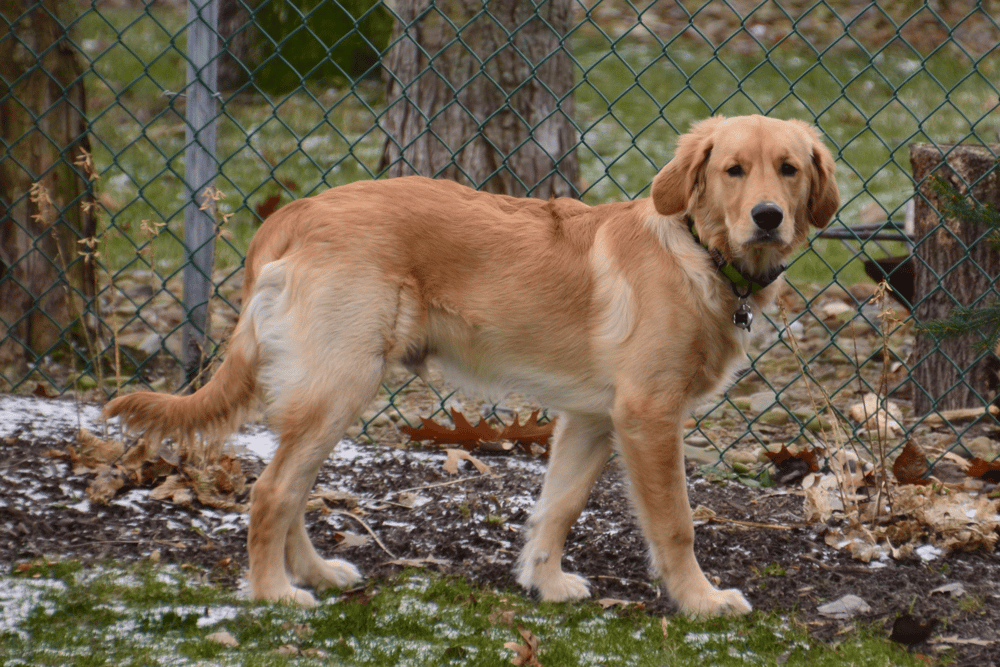
Most of the many good character traits attributed to Golden Retrievers are based on their adult years.
Adult goldens are known to be “good family dogs”, friendly, full of energy, and brainy.
They love their families deeply and form strong bonds with them, and they’re great with kids, which is partially why they have a reputation of being “good family dogs”. They typically make good friends for kids once they’re a little older (5-12ish) because they’re just as adventurous and full of energy as their tiny human companions.
When they’re 6-week-old puppies, they’re adorable little balls of fur who are just starting to play and explore. They love to chew and they’re capable of doing a lot in the short bursts that they’re awake.
Even though they look like sweet little angels, you have to stay right on top of them at 6-weeks-old because they’re constantly getting into stuff. This is because they’re too young to know good from bad, right from wrong.
Your 6-month-old pup is right smack in the middle of these two developmental stages in what is known as canine adolescence. This means your pup is now a teenager.
They’re losing some of their puppy qualities, but they’re not quite as mentally developed as an adult dog.
As with every other developmental milestone I’ve covered, your pup will have new needs when it comes to training and feeding, and they’ll have different growth and developmental milestones.
But right now it should be exciting to watch your pup in this stage because the world is their oyster. There are lots of new experiences to introduce them to. And when they test your patience, just remember that part of adolescence is pushing boundaries!
How Big is a 6-Month-Old Golden Retriever?
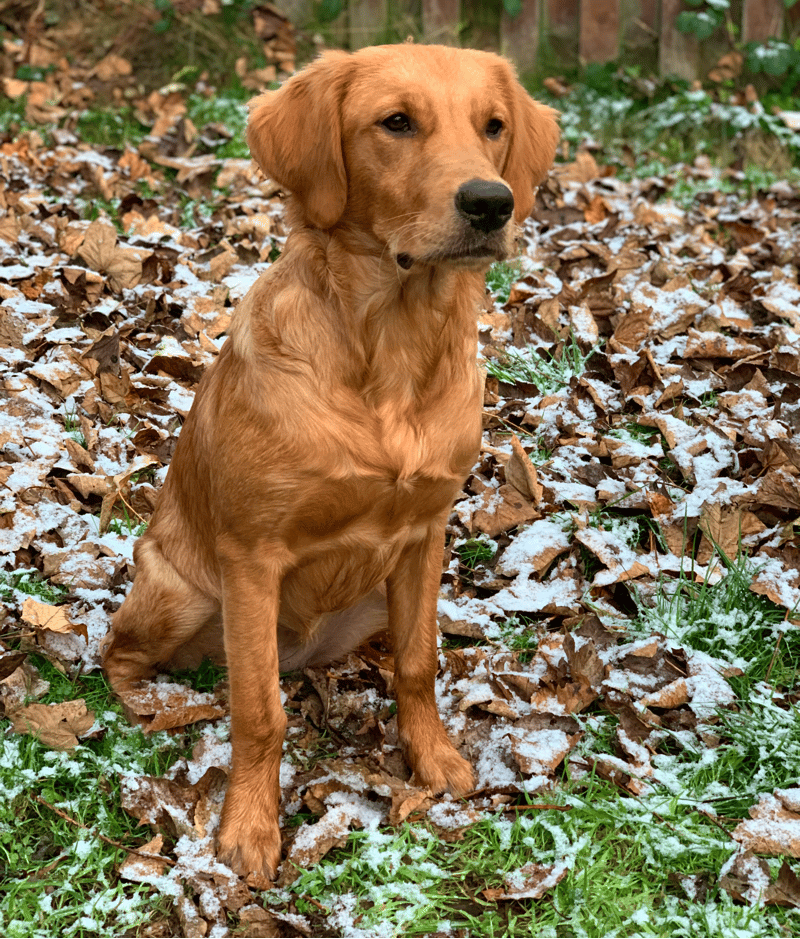
Most 6-month-old Goldens weigh between 35-50 lbs. During the 3-6 month period, Goldens grow a lot in a short period of time.
But now that your pup has reached 6 months old, their growth should start slowing down. This doesn’t mean that they’re done growing, just that they won’t continue to grow as much as rapidly as they previously did, which is good because you don’t want a Clifford the Big Red Dog situation!
An adult male’s body weight is typically 65-75 lbs, while a female is 55-65 lbs. When your pup reaches 6 months of age, they should be around 2/3 of their adult body weight.
They’ve usually reached their adult height when they’re a year old, but they typically keep gaining weight until they’re about 18 months old, although the guidelines for weight development aren’t as defined as the ones for height.
Basically, even though your pup has had huge, adult-sized paws for a while now, the rest of their bodies won’t catch up to them for a few months.
How Much To Feed A 6-Month-Old Golden Retriever
Of course, because your pup has grown so much, they’ll have different feeding chart.
Most female pups this age will eat around 3 cups of food per day, which should be spread out between three separate meals.
However, male pups will need a higher caloric intake to account for their bigger body structures, and you should feed them more like 4 or 5 cups per day.
You should feed your puppy quality dog food to help facilitate their growth. Adult dog food simply doesn’t contain the necessary ingredients to support brain development and other types of growth.
Your pup is probably learning about the wonders of human foods at this time, but you need to severely limit how much of these you feed them. Golden Retrievers are quite prone to obesity (like many of us, they like food, too.).
Exercise Needs of a 6-Month-Old Golden Retriever
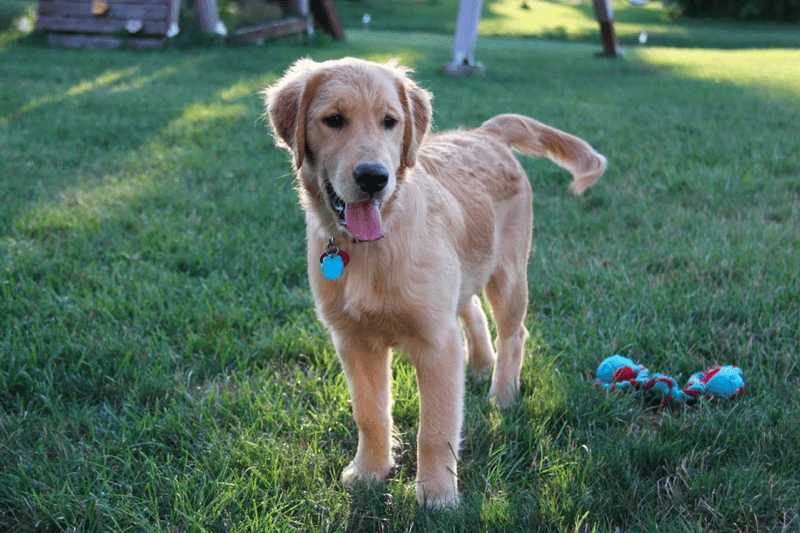
Your 6-month-old Golden Retriever’s exercise needs are drastically different from the short walks you had been taking your pup on when they were 6-weeks-old and they could barely make it to the next block.
Your pup can now enjoy exercise for an hour or two per day.
You’ll notice that your 6-month-old Golden Retriever will likely be able to take longer walks now. They should even be able to accompany you on short jogs, which will excite those who chose a golden retriever pup to have an exercise companion.
You should change up the places you take your pup for walks and runs so that they’re fun and lively.
Because of their retriever nature, your 6-month-old Golden will also love any sort of game where they get to catch or chase something, as well. They’re experts at playing fetch!
Make sure to buy your pup some new chew toys so that they’re not getting bored with the ones they have. (If we’re being honest, you’ll probably notice that several of their toys are ratty by now anyway!)
You still need to be careful about the intensity of the exercise your pup partakes in. Because they’re still growing, high-intensity exercise or prolonged exercise could cause injury to their muscles and growth plates, which can cause permanent damage. So, since you don’t want to permanently maim your pup, keep exercise light and fun, and limit how long your pup plays.
If you plan your pup’s exercise well, you’ll be able to not only give them physical exercise to burn off some energy but also mentally stimulate them to keep their big brains busy!
If you want to learn more about the exercise needs of golden retrievers, check out our article about How Much Exercise Golden Retrievers Actually Need (Puppies, Adults, Seniors)
How to Deal with Biting
Golden Retrievers were originally bred as hunting dogs that were designed to bring prey back to their masters without mauling it.
This means that they use their mouths-a LOT. So they’ll put everything in their mouths, including parts of you.
However, they don’t typically bite down hard, which is good news for any Golden Retriever owner dealing with biting and chewing. They typically just sort of put their mouths on you, instead.
They’re usually mostly out of the biting phase by the time they’re 6 months old because they’ve started developing adult teeth when they’re about 4 months old. So they’ve had a couple of months to get this out of their system already. But every dog develops at different rates, so your pup may still be going through it, and that’s completely normal.
The key to dealing with biting is to not only make sure they have enough exercise and sleep to ensure they’re functioning at optimal energy levels, but to also keep chew toys and soft toys around to redirect them if they start to bite or chew on something they shouldn’t.
If your pup is still biting and chewing, then the good news is that they’ll be done with it soon!
If you’re dealing with puppy chewing and biting, then I recommend you read our article about the 17+ Best Toughest, Most Durable, Longest Lasting Dog Toys for Aggressive Chewers.
Behavioral Expectations
So far you’ve been working with your puppy on potty training, obedience training, learning to be alone, and socialization.
The next phase in your puppy’s training will be a little more difficult because they’re in their teenage years and they’ll be a little more disobedient and less eager to listen to you.
You’ll need to keep up with your puppy’s training during this time because consistency is what will make the training stick in your pup’s head long term.
Obedience Training
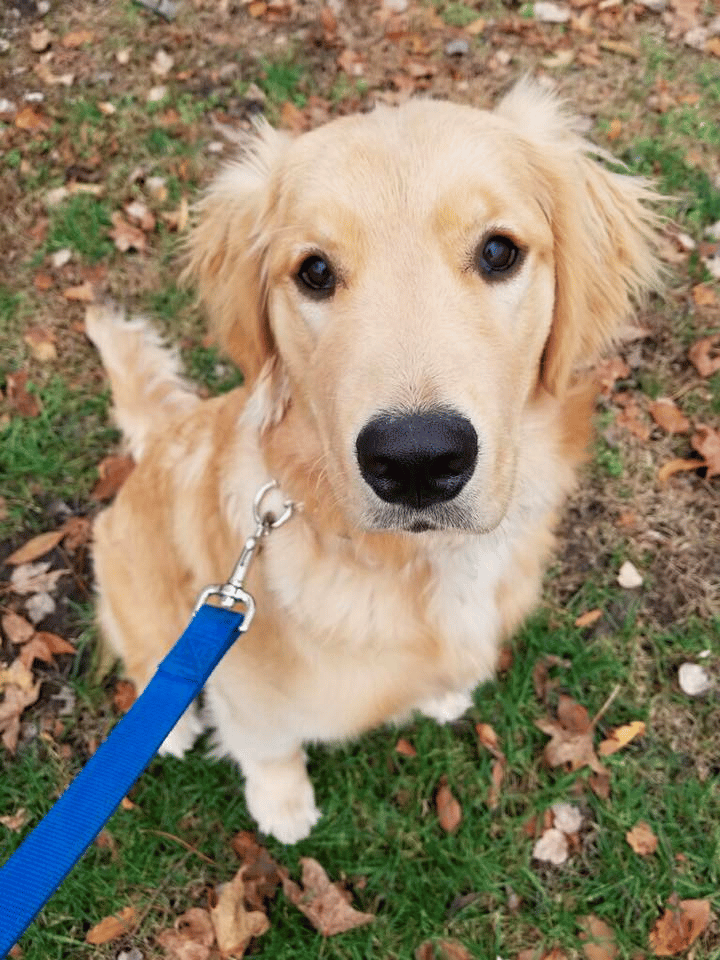
Although you’ve likely been working on obedience training with your pup, you’ll need to continue it during this period.
Puppies between 2 and 6 months old are prime candidates for obedience training.
At their core, Golden Retrievers are people-pleasers, so they’ll grow to love their training if you show that you’re happy when they do well with it.
Obedience training provides your dog with a valuable set of behavioral skills and teaches them how they should or shouldn’t act. This knowledge and experience will come in handy while they’re going through their teenage stage because they’ll have a better idea of which boundaries can be pushed.
If you choose a group obedience class, your pup will have the added benefit of socializing with other people and dogs, which your Golden will love because of their friendly nature.
Staying on top of obedience training can be difficult. There are already so many things that you have to cram into your busy schedule!
But if you keep up with it, your pup will begin to trust that you know what’s best for them and that they can listen to what you say. This sort of bond is priceless. It will not only help you deal with behavioral issues through all of your pup’s developmental stages but will also provide you with a sense of accomplishment and a warm, fuzzy feeling.
It’s important to teach your dog some of the things they’ll need to perform on a regular basis, and rules about how to act in your home, as well as when you take them out in the world on adventures.
Here are a few of the things your dog can pick up through obedience training:
- Coming to you when called
- Waiting patiently while you answer the door
- Sitting while you get out their collar or harness and leash (instead of getting excited and freaking out)
- “Heel”, or walking beside you on the leash, matching your pace, not pulling or darting all around
- Calmly and patiently standing still and allowing you to brush their coat
What You Can Expect from Your Teenaged Pup
Between the ages of 6 and 18 months, your sweet little Golden Retriever puppy will go through their canine adolescence stage. Translation: they’ll start acting like teenagers, and any parent can tell you that the teenage years are just as difficult as they are rewarding!
A teenaged Golden Retriever puppy can be just as moody as any human teenager.
They’re going to be easily distracted. So, don’t be surprised if it appears that they aren’t paying attention to your commands when you’re outside or if there’s a lot of noise going on in your house. Even if you give them a command that they’ve obeyed thousands of times before, they’re likely to get caught up in everything else going on around them and do their own thing at times, rather than listen to you.
It’s not uncommon for even the most friendly and outgoing Golden Retriever pups to become a bit introverted and shy during this time. Hey, when you’re “going through it”, you don’t want to socialize either, right?
It’s also important to know that on top of their moodiness, adolescent canines will typically change their behavior, as well. Pups that were once angelic and well-behaved transform into unpredictable, destructive fur balls.
You’re going to find your pup chewing a bit more, tearing things up, digging holes in the yard, and generally being destructive. You’ll also find that they start developing seemingly random and chaotic habits, like barking for hours on end for no discernible reason.
You’ve already been learning to deal with your puppy’s high energy levels, but this is even more important for your teenage Golden.
Golden Retrievers were bred to be athletic. They’re designed to navigate through all sorts of terrain all on their own in order to retrieve game birds that their owner killed and bring them back to them.
Since many people don’t have the means to let their Golden Retriever puppies perform such activities on a regular basis, they can accumulate a lot of pent-up energy really fast. And your teenaged Golden Retriever acts out because of it.
How to Effectively Deal with Your Adolescent Golden Retriever’s New Behaviors
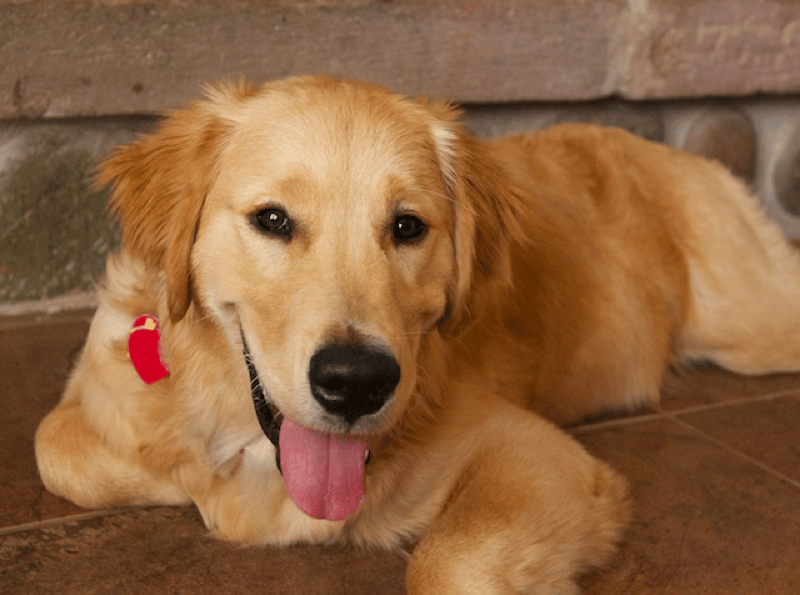
It may sound like a nightmare to deal with a bratty, teenaged Golden Retriever, but there are ways you can effectively deal with their new behaviors.
You’ll notice that making sure your pup gets plenty of exercise and training sessions throughout the day will vastly improve their behaviors and their mood.
Exercise is also important during this stage because your Golden will want to stress eat. Because Golden Retrievers are so prone to obesity, it’s a good idea to get your pup out and about to keep the extra pounds off.
If you can, find your pup a canine friend. This will go a long way towards mood improvement. But they can also play and exercise with another dog in ways that they can’t with you. Because of the pack-like nature of dogs, if your golden makes a new canine friend, they’ll quickly grow to have a new life-long best friend.
You need to remember that mental stimulation is important for Golden Retrievers, as well. You can take your pup on several walks every day, but if you’re not engaging their big brains they’ll be both exhausted and bored- a combination that’s never good in Golden Retrievers!
If you give your pup puzzle toys or feeding toys, it will keep their mind engaged while they’re playing with them. You can also go the extra mile to teach them new tricks or behaviors during feeding time, which will keep their brains working at the same time they get food- which will seem like a win-win situation for your pup.
Sometimes when you drain your pup’s mental energy, they’ll become more tired than they would if you’d simply worked on their physical energy. So in that regard, it’s actually a good thing to have a mentally exhausted pup.
Here’s our article about the Top 10 Best Interactive Dog Toys to Keep Even the Smartest Pooches Busy, which should help you find some ideas for keeping your pup mentally stimulated.
You’ll almost certainly be frustrated with your pup as they go through this developmental stage. But by keeping both their mind and their body active and giving them a new friend to play with, you’ll have a lot less undesirable behavior to deal with, which is good for everybody.
If you’re patient and work with your pup, then eventually you’ll have an emotionally- mature, well-behaved dog, and an excellent family member!
Conclusion
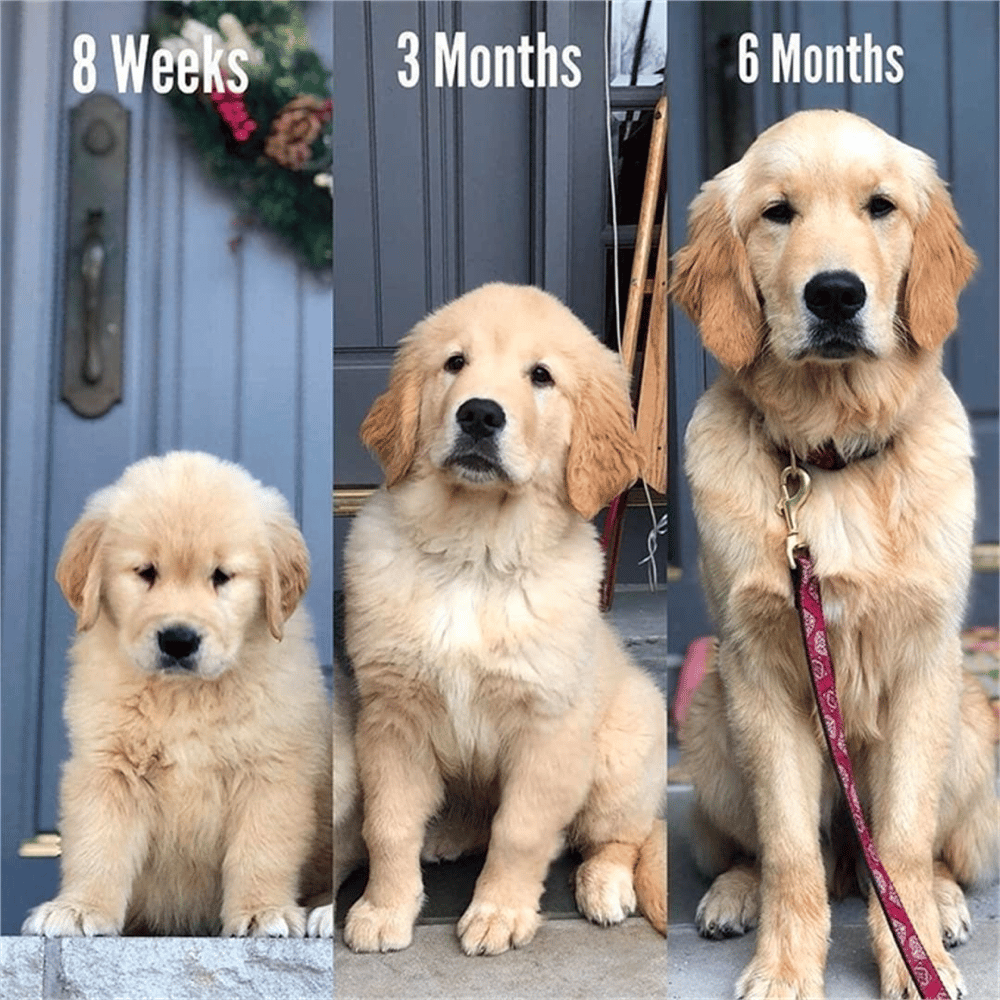
Whether you already have a 6-month-old Golden Retriever, you’re about to get one, or your pup hasn’t quite reached that milestone yet- you’re in for a treat!
There’s a reason that Golden Retrievers are one of America’s most popular dogs. They’re friendly, eager to please their owners, and they’re adorable.
While they’re going through their teenage phase, you’ll notice that your Golden will be a bit more rambunctious and rebellious than usual. This new sassy, moody pup is going to try your nerves and push boundaries to find out just how much they can get away with. But, don’t worry, this is just a phase. They’ll grow out of it at somewhere around 18 months. And your pup will still be just as cute while they’re going through their teenage phase as they were when you first brought them home.
It’s going to take a lot of patience and calm guidance on your part to get you both through this phase. But with enough understanding and guidance, you’ll both be able to easily navigate through these turbulent waters and come out the other side relatively un-phased!
If you still haven’t found the perfect Golden Retriever for your family, you should read our article about How to Find Reputable Golden Retriever Breeders and What to Avoid.
In case you missed the other articles in this series, you can catch up here:
- Golden Retriever Puppy Growth Chart
- 6 Week-old Golden Retriever Puppies: Developmental Milestones to Expect and Mistakes to Avoid
- 8 Week-old Golden Retriever Puppies: Growth, Developmental and Behavioral Expectations
- 3 Month-old Golden Retriever Puppies: Growth and Development
- 4 Month-old Golden Retriever Puppies: Feeding, Training, Sleeping
- 5 Month-old Golden Retriever Puppies: Important Developmental Milestones, Dealing with Behavioral Issues
- 7-Month-Old Golden Retriever: Full-Blown Adolescence And You
- 8-Month-Old Golden Retriever: Behavior, Training and Development
- 1-year-old Golden Retriever Puppy: A Journey into Adulthood
- 2-Year-Old Golden Retriever: Full-Grown, Adulthood, Playful
- Senior Golden Retriever: Signs of Aging and How to Care for Your Old Dog
